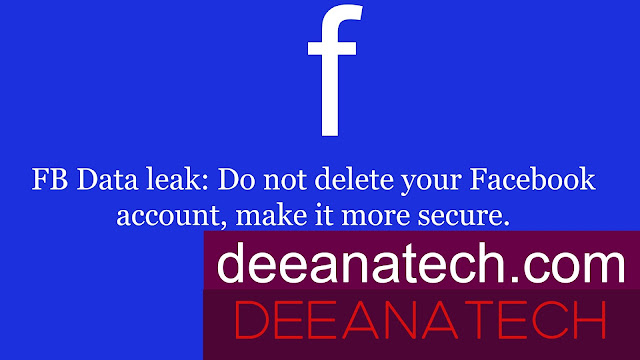FB Data leak: Do not delete your Facebook account: The British data analytics company Cambridge Analytica is accused of stealing data from about 50 million Facebook users during the US presidential election in 2016, which was used in Donald Trump’s election campaign. In the US presidential election in 2016, this company has given trump service.
In this article, we will discuss the steps you can take to make your Facebook account more secure, despite the recent data leak. We will cover the following topics in detail:
Understanding the FB Data Leak
What's Next
If users are concerned about the security of their personal information, they may be concerned about the recent data leak on Facebook. Here we explain what happened during the data leak and how it affected Facebook users in this part.
This was revealed in a report by the New York Times and London Observer. In such a situation, there has been a growing concern among people about how secure their data is on their favorite social media platforms. Also whether they continue to use it or not. To keep your data secure on Facebook, there are a few things to keep in mind.
Cyber security expert Nitin Bhatnagar explains that on Facebook, you can protect your data to some extent only by changing the settings. For this, you get options in Facebook’s settings.
Steps to Make Your Facebook Account More Secure
To prevent your Facebook account from being compromised, you can take several steps to make it more secure. We will outline these steps in detail, including:
- Enabling Two-Factor Authentication
- Reviewing App Permissions
- Securing Your Password
- Checking Your Privacy Settings
Enable ‘Two Factor Authentication‘
The most important thing is to enable ‘Two Factor Authentication’ in your profile. By enabling this setting, even if someone finds out your password, you will not be able to access your profile. Notification goes to your registered mobile number when you try to log in from a device other than your regular devices.

In such a situation, if your profile is logged on another device, a code is required. To enable ‘Two Factor Authentication’, you will need to go to ‘Account Settings‘ of your profile. Go to ‘Security and Login’ option here, then in the window that opens, in the section of ‘Setting Up Extra Security’, you will get the option of ‘Two Factor Authentication‘. Apart from this, you will also find other security related options here, you can also enable them.
Best Practices for Facebook Security
Apart from the steps mentioned above, there are several best practices that you can follow to ensure the security of your Facebook account. These include:
- Avoiding Suspicious Links and Messages
- Being Careful with Personal Information
- Logging Out of Devices
Check where your account is logged in
Apart from this, if you want to check that no one else is using your profile. For this also, you have to go to ‘Account Settings’ and go to ‘Security and Login’. Here you will see in the section ‘Where are you logged in’ on which devices your profile is logged. If you see a suspicious device, change your password immediately.
Set password too hard
Never set your birthday, wedding anniversary, your or a loved loved one’s name as a password. one’s name as a password. In such a situation, it is easiest to hack your account through social engineering. So try to set a complex password for your social media account.
Password should be at least 8-10 characters. Set your password using alpha numeric (symbol), numeric (count), upper case (capital letters), lower case (English letters) etc.
Write comments about this article how helps you…..
Any query write us.….
FAQ
Q: What is the Facebook data leak and how did it happen?
A: The Facebook data leak refers to the unauthorized access and sharing of personal information from millions of Facebook users. It happened when hackers exploited a vulnerability in Facebook’s systems that allowed them to steal access tokens, which could be used to gain access to users’ accounts.
Q: How can I check if my Facebook account was affected by the data leak?
A: Facebook has stated that it has notified all affected users, so you should have received a notification if your account was compromised. However, you can also check your recent activity log to see if there have been any unauthorized logins or other suspicious activity on your account.
Q: What is two-factor authentication and how can I enable it on my Facebook account?
A: Two-factor authentication is a security feature that requires users to enter a code or provide some other form of additional verification in addition to their password when logging into their account. To enable two-factor authentication on your Facebook account, go to the Security and Login settings and click on “Edit” next to “Use two-factor authentication.” From there, you can choose to receive codes via text message, a third-party authentication app, or a security key.
Q: How can I review and revoke app permissions on my Facebook account?
A: To review and revoke app permissions on your Facebook account, go to the Apps and Websites section of your settings and click on “Logged in with Facebook.” From there, you can see a list of all the apps and websites that have access to your account and revoke their permissions if you no longer want to use them.
Q: What should I do if I receive a suspicious message or link on Facebook?
A: If you receive a suspicious message or link on Facebook, do not click on it. Instead, report the message or link to Facebook and delete it from your account. You should also run a virus scan on your device to make sure it has not been infected with malware.
Q: How can I log out of all devices on my Facebook account?
A: To log out of all devices on your Facebook account, go to the Security and Login settings and click on “See More” next to “Where You’re Logged In.” From there, you can see a list of all the devices that are currently logged into your account and log out of them individually or all at once.










My spouse and I stumbled over here by a different website and
thought I should check things out. I like what I see so now i am following
you. Look forward to checking out your web page again.
My spouse and i like, produce I recently found just the thing I used to be trying to find. You might have concluded my own four morning very long search for! The almighty Thanks a lot person. Have a very wonderful evening लहंगा. Cya
We have been a small grouping of volunteers plus beginning the latest system in the area. Your web site offered us by using techniques to operate for. You might have conducted a good activity plus each of our full town can be happy to you.
Great Article
Cyber Security Projects
projects for cse
Networking Security Projects
JavaScript Training in Chennai
JavaScript Training in Chennai
The Angular Training covers a wide range of topics including Components, Angular Directives, Angular Services, Pipes, security fundamentals, Routing, and Angular programmability. The new Angular TRaining will lay the foundation you need to specialise in Single Page Application developer. Angular Training